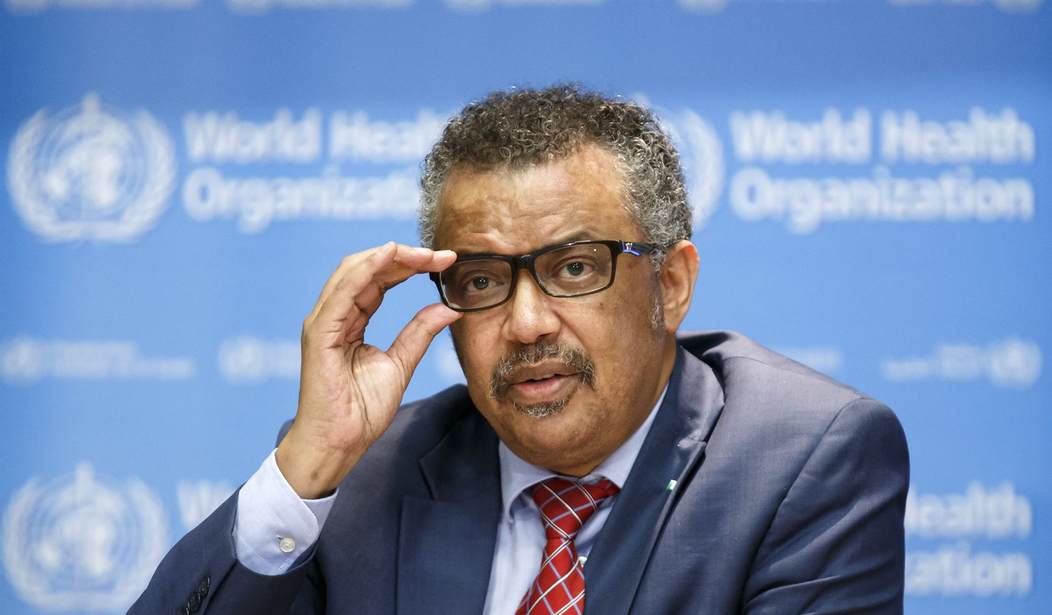In their effort to ensure that they have ready access to life-saving vaccines, the governments of many less developed countries are making demands that could end up killing the very companies that research and develop them. Some governments of developed countries with pharmaceutical companies that research and develop these drugs are holding firm against those demands, thank goodness.
That’s the short explanation for what’s going on in Geneva, where health ministers from the 194 World Health Organization member states have gathered to try to pick up the pieces of a failed negotiation over the terms of a proposed new “pandemic preparedness” treaty.
In the aftermath of the COVID-19 outbreak, many member states thought it would be a great idea to better plan and prepare for the next international outbreak, and they thought it made sense to try to do it together. Unfortunately, rather than start that process by making reforms to the World Health Organization – which performed poorly during the COVID outbreak, covering as it did for the Chinese Communist Party’s abysmal behavior – they went right at the heart of the problem, as they saw it: Developed countries had healthcare (largely pharmaceutical) infrastructures that they did not, and that “inequity” needed to be addressed.
Beginning in 2021, delegates from the member states started talking about two related efforts – amending the International Health Regulations (IHR) that first went into effect in 1951, and drafting a new treaty designed to help member states better prevent, prepare for, and respond to an international outbreak. Those meetings have since gone on through nine international conferences over the last two and a half years. The aim of the conferees was to have finalized amendments to the IHR and a final draft treaty ready to be confirmed this week.
Recommended
But something got in the way. According to the Associated Press, the failure to finalize the draft agreement was caused by “disagreements over sharing information about pathogens that cause pandemics and the technology used to fight them.” Wrote The Guardian, “serious disagreements remain, including on finance; how much product pharmaceutical companies should be required to set aside for those countries most in need; intellectual property rights and sanctions.”
Translation: Less developed countries, with less know-how and fewer financial and intellectual resources, want more from the better developed countries – more personal protective equipment (PPE), more masks, and, most importantly, more vaccines.
But the governments of the less developed countries don’t just want finished products, they want the intellectual property behind the vaccines. They want the formulae.
Here, for instance, is just some of the language from the draft treaty: “Each Party shall, in order to enable the sufficient, sustainable and geographically diversified production of pandemic-related health products, and taking into account its national circumstances: (a) promote and otherwise facilitate or incentivize the transfer of technology and know-how for pandemic-related health products, in particular for the benefit of developing countries and for technologies that have received public funding for their development, through a variety of measures such as licensing, on mutually agreed terms … ”
Further, states the treaty draft, each party to the agreement shall “promote the transfer of relevant technology and related know-how for pandemic-related health products by private rights holders, on fair and most favourable [sic] terms, including on concessional and preferential terms … ”
Forcing pharmaceutical companies that develop vaccines to reveal their “source code” would be catastrophic. It would destroy the intellectual property rights that enable and incentivize such companies to invest billions of dollars of their shareholders’ equity into research and development efforts in the first place. It would, quite simply, lead to the end of research to develop new life-saving drugs.
According to the Associated Press, the British government “said it would only agree to an accord if it adhered to British national interest and sovereignty.” Given that the United Kingdom is home to pharmaceutical behemoths like AstraZeneca and GlaxoSmithKline, that certainly makes sense.
Republican senators recognize the threat, too – all 49 of them signed a letter to President Biden on May 1 that declares that the draft treaty “focuses on mandated resource and technology transfers, shredding intellectual property rights, infringing free speech, and supercharging the WHO.” The letter concludes by urging Biden to “withdraw your administration’s support for the current IHR amendments and pandemic treaty negotiations” and declares that “should you ignore these calls, submit any pandemic related agreement to the Senate for its advice and consent.”
The Biden administration sees things differently. Health and Human Services Secretary Xavier Becerra, in Geneva for the assembly, told reporters Wednesday that “I believe we are going to get this done,” and played down the remaining differences: “I don’t think there’s today substantive disagreement about the essential elements – it’s more how they are packaged, how they are defined.”
Health ministers from around the world may have missed their mark this week, but they’re not giving up. They’ll likely extend the discussions for another year or two.
The conservative grassroots activists I work with and represent through Tea Party Patriots Action have been fighting for healthcare freedom since we first opposed ObamaCare back in 2009. We didn’t believe in one-size-fits-all healthcare then, and we still don’t. That goes doubly for international healthcare bureaucracies – just as there is no one-size-fits-all healthcare for individuals, there is no one-size-fits-all healthcare for nations, either.
Just as importantly, it makes no sense at all to sign on to a treaty that destroys the intellectual property rights that enable and incentivize pharmaceutical companies to research and develop new life-saving drugs. Those Republican senators are right – the U.S. should withdraw from the negotiations. That would be the best solution of all.
Jenny Beth Martin is Honorary Chairman of Tea Party.
























Join the conversation as a VIP Member